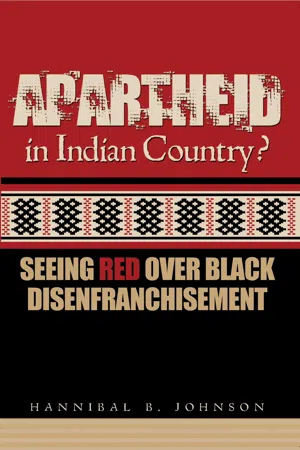
Apartheid in Indian Country
Seeing Red Over Black Disenfranchisement
- English
- ePUB (mobile friendly)
- Available on iOS & Android
Apartheid in Indian Country
Seeing Red Over Black Disenfranchisement
About this book
The binding persons of African descent and Native Americans trace back centuries. In Oklahoma, both free and enslaved Africans lived among the "Five Civilized Tribes" - the Cherokee, Muscogee (Creek), Chickasaw, Choctaw, and Seminole Nations. These tribes officially sided with the Confederacy during the Civil War. After that internecine conflict, the tribes-except for the Chickasaws-adopted their respective "Freedmen." The term Freedmen embraced both formerly-enslaved persons of African ancestry, and those free persons of African ancestry who lived among the tribes. In the modern era, the tribes who granted citizenship to hide their Freedmen have sought to disenfranchise them. Freedmen descendants-persons of African ancestry with blood, affinity, and/or treaty ties to the Five Civilized Tribes-still struggle for recognition and inclusion. The Freedmen debate rages in the Cherokee Nation of Oklahoma, where legal battles in tribal and federal courts have waged, and a confrontation with the Bureau of Indian Affairs over the issue threatens tribal sovereignty. The Cherokee controversy is both illustrative and emblematic of larger questions about the intersection of race, Indian identity, and Native American sovereignty, Johnson traces historical relations between African-American and Native Americans, particularly in Oklahoma, "Indian Country." He examines some legal, political, economic, social and moral issues surrounding the present controversy over the tribal citizenship of the Freedmen. Wrestling with the issues surrounding Freedmen identity and rights will illuminate and advance the American dialogue on race and culture.
Tools to learn more effectively

Saving Books

Keyword Search

Annotating Text

Listen to it instead
Information
Table of contents
- Cover Page
- Title Page
- Copyright Page
- Contents
- Acknowledgments
- Introduction
- I. Pre-Removal, Removal, War and Treaties: To the Victor Go the Spoils
- II. Relations Between Africans and Native Americans in the Five Civilized Tribes: Deep and Intertwined Roots
- III. A Legacy of Mixing and Matching: Debunking the Purity Premise.
- IV. Post-Civil War Adaptation, Indian Enrollments and the Allotment Process: The Erosion of Indian Territory
- V. The Impact of Racism and Jim Crow: “Blacklash” in Indian Country
- VI. Money Talks: The Changing Economics of Tribal Membership
- VII. Fighting for the Franchise: The African-American Struggle for Tribal Rights
- Conclusion
- A. Having Their Say: The Freedmen Respond to Detractors
- B. The Voice of a Freedmen Advocate: Marilyn Vann, in Her Own Words
- C. The Cherokee Nation Perspective on the Freedmen
- D. A Conversation with David Cornsilk
- E. Epochs and Signposts in Native American History
- F. Federally Recognized Indian Tribes in Oklahoma
- G. African-American Civil Rights in the United States: A Timeline
- State of the Union Address: President Andrew Jackson (December 6, 1830)
- Endnotes
- Index
Frequently asked questions
- Essential is ideal for learners and professionals who enjoy exploring a wide range of subjects. Access the Essential Library with 800,000+ trusted titles and best-sellers across business, personal growth, and the humanities. Includes unlimited reading time and Standard Read Aloud voice.
- Complete: Perfect for advanced learners and researchers needing full, unrestricted access. Unlock 1.4M+ books across hundreds of subjects, including academic and specialized titles. The Complete Plan also includes advanced features like Premium Read Aloud and Research Assistant.
Please note we cannot support devices running on iOS 13 and Android 7 or earlier. Learn more about using the app